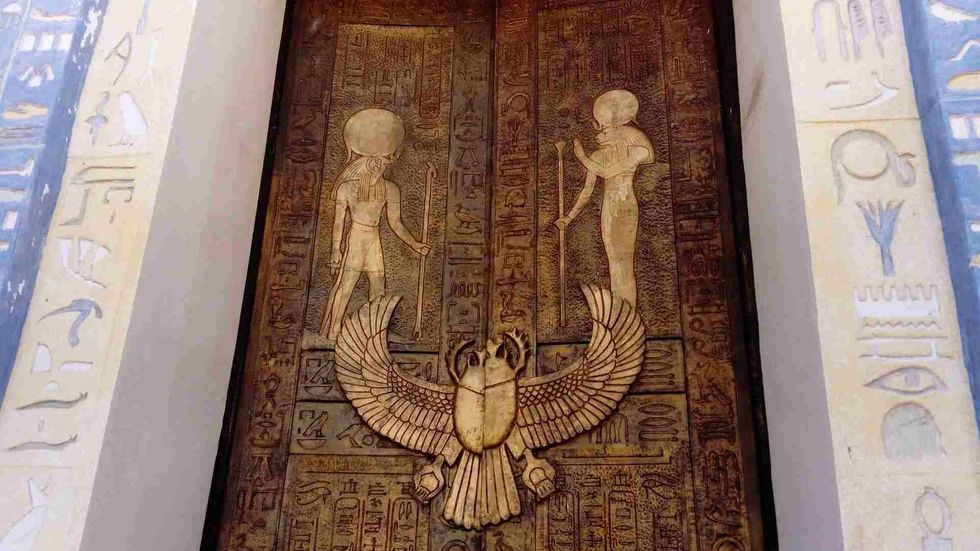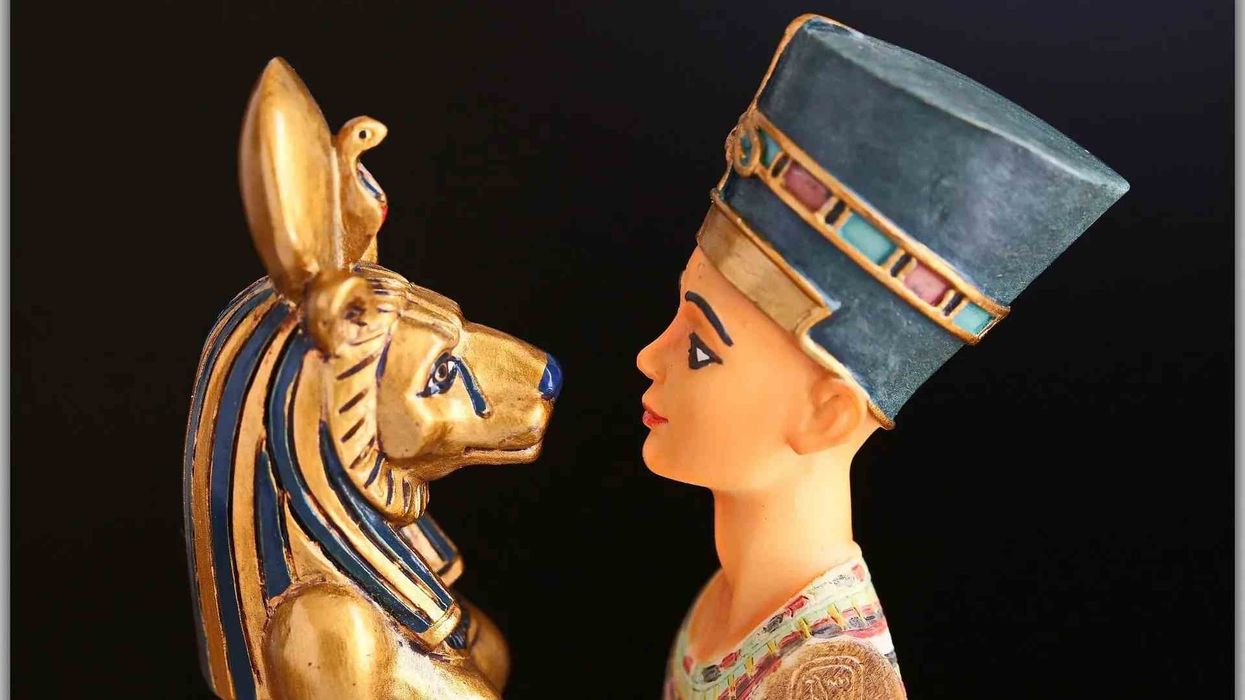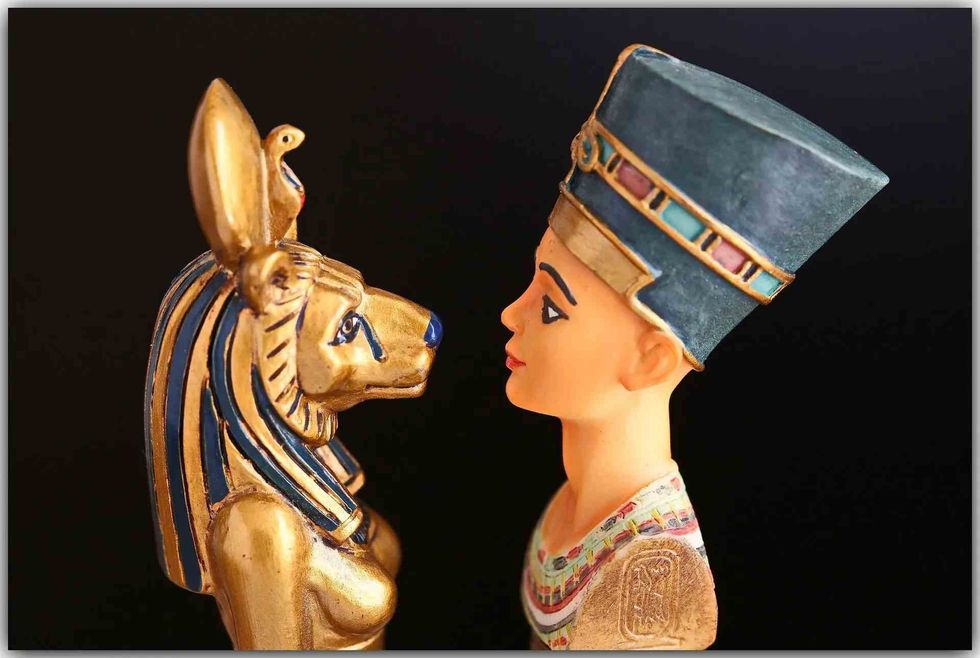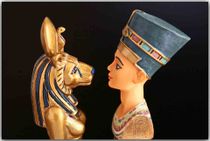Cleopatra's Children: No One Told You These Truths!

Cleopatra VII, who is often referred to as Cleopatra, was one of the last true Pharaohs who ruled the land of Egypt.
Not only did Cleopatra VII rule the lands of Egypt, but she also ruled Cyprus, Libya, and multiple other territories in Egypt. Cleopatra VII came under the series of Ptolemies rulers who had control over Egypt for more than 300 years. Cleo Patra took birth in the already troubled Ptolemaic dynasty.
The origin of the Ptolemaic dynasty is traced from a Macedonian general who had served for Alexandra The Great. Cleo Patra was the daughter of Ptolemy XII. At the time of her birth, Ptolemy XII was under immense pressure from the Roman Empire and struggling to keep his empire together.
Ironically, it was Julius Caesar of the Roman Empire who had helped Cleo Patra later on. Cleopatra is one of the best-known female rulers in history.
She was known for her intelligence and strategic practices. Please continue reading to learn more about Cleopatra's family, her life, and her confrontation with Caesar Augustus. Afterward, also check out facts about George Washington and Augustine Washington's children.
Cleopatra Children's Early Life And Family Life
According to written sources, Queen Cleopatra had four children, all of them had an interesting early life. Her own family life was tense.
In 55 BC, with the support of Romans, Cleopatra's father, Ptolemy XII, was put back onto the throne, which he ruled alongside his 17-year-old daughter Cleopatra. After her father's death, it was wished in his will that Cleopatra should share the throne alongside her brother and husband, who was Ptolemy XIII.
Ptolemy XIII and his counselors refused to recognize Ptolemy XII's will, and violence ensued, with Cleopatra being forced to depart the royal house. Julius Caesar was the one who helped Cleopatra reclaim her reign.
Among the Cleopatra children, Caesarion is the best known. In late 48 BC, Julius Caesar of the ROME and Cleopatra began an affair.
Caesarion was most likely born in Alexandria, Egypt, around 47 BC. Even though not everyone believed her, Cleopatra always maintained and told everyone that the boy's father was Julius Caesar. Cleopatra and her son Ptolemy XV, known as Caesarion, arrived at Rome in 46 BC.
They also stayed in one of Julius Caesar's mansions on the outskirts of Rome. As both Caesar and Cleopatra were married to other people, this caused quite a stir in Rome.
Caesarion was nicknamed after his father, Julius Caesar. Two years later, when Julius Caesar was assassinated in 44 BC, Cleopatra had waited in Rome until his will was read out, hoping that Caesarion would be Caesar's heir to the throne of Rome.
However, the Roman Republic's new ruler was Octavian, chosen as Caesar's heir instead. It's pretty surprising that Octavian was selected as the heir even though Caesarion was the only biological child of Julius Caesar.
After his father's death, Caesarion moved back to Egypt with his mother. He was only three at the time.
Not much is known about Caesarion's life after this time period. The material found tells us that Caesarion grew up in the palace of Alexandra, which was ancient Egypt's capital at the time.
Just like his ancestors and family members such as Ptolemy XIII and Ptolemy XII, Caesarion had also received Greek Education. He also entered the 'gymnasium' when he was around 17 years old, which meant that as according to Greek tradition, he was now an adult.
Once Cleopatra returned to Egypt after Caesar's death, Cleopatra had established a relationship with Mark Antony, another Roman power figure.
Cleopatra gave birth to twins, Cleopatra Selene and Alexander Helios, in 40 BC. Cleopatra Selene, the daughter, grew up in Alexandria.
Daughter Selene was raised as a great Ptolemaic princess, and just like her eldest brother, Caesarion, Cleopatra Selene had also received Greek Education. For her aspirational parents, though, this was insufficient. When Cleopatra Selene was six years old, Cleopatra Selene was proclaimed Queen of Cyrenaica, which was Egypt's neighbor at the time.
Cleopatra's second twin was named after the legendary figure Alexandra the Great. Cleopatra's family was inextricably linked to Alexander's since she was descended from five of Alexander's generals. This was something Cleopatra was very much proud about. Cleopatra's son Alexander Helios was born in Alexandria around 40 BC.
His father, Mark Antony, had already departed Egypt by that time. As a result, Alexander did not meet his father until 37 BC. Mark Antony had recognized both of his twins in that year. Alexander grew up in Alexandria's court.
Alexander Helios's father, Mark Antony, celebrated a victory in Egypt when he was around six years old. Mark Antony granted the territory to all of his children during the event known as the Donations of Alexandria.
The lands of Armenia, Media, and Parthia were given to Alexander Helios. Mark Antony was overconfident because he had not yet captured Media or Parthia, yet he still gifted these to his son. Prince Alexander grew up in Egypt until he was ten years old.
Ptolemy Philadelphus II was Cleopatra and Mark Antony's youngest child. In 41 BC, Cleopatra and Mark Antony began their relationship.
After a few tumultuous months, Mark Antony returned to Egypt to resume his responsibilities, and both of them parted ways. They rekindled their romance three years later. Cleopatra and Mark Antony remained together for the next seven years until their deaths.
Ptolemy Philadelphus was born during this stable time, one year after his parents Cleopatra and Mark Antony got back together. Like his brothers Alexander Helios and Cesarean, he was given a grand name. One of the Egyptian Queen's forefathers was the original Ptolemy Philadelphus.
Egypt's monarchy had reached its maximum territorial extent during his reign. The Ptolemy Empire thrived during his time.
When his parents celebrated their Roman victory at Alexandria, Cleopatra's son, Ptolemy Philadelphus, was three years old. Like his siblings, he was given domains. Ptolemy lived in luxury at the Egyptian court until he was seven years old.
What happened to Cleopatra's children?
After Mark Antony and Cleopatra's death, her children had quite a tragic fate.
When it comes to Caesarion's fate, Octavian marched into Alexandria and conquered it on August 30, BC. A few days later, the rulers of Egypt, Mark Antony, and Cleopatra committed suicide.
Cleopatra's Son Caesarion, on the other hand, was not at the time in Alexandria. Cleopatra had wisely dispatched Caesarion to the lands of the East. 17-year-old Caesarian was supposed to reach Berenice, a Red Seaport, and use his fortune to sail to Arabia or India.
In these lands, Cleopatra thought that Caesarian would be safe from Octavian's threat. However, Octavian dispatched emissaries to Caesarion after Cleopatra committed suicide.
The Roman said that Caesarion's life would be spared and Caesarion would be a client-king of Rome, as his mother had been if he had returned. Rhodon, Caesarion's Greek instructor, persuaded his student to trust Octavian and turn back.
Trusting his tutor's advice, Caesarian made it back. However, Caesarian was executed by Roman soldiers in the middle of30 BC, only days after his mother and Mark Antony had committed suicide.
Selene had quite a different fate as compared to her elder brother Caesarean. Cleopatra Selene II was taken to Italy by Octavian. Selene II was chained while Octavian paraded her through the streets of Rome in triumph.
However, then there was a break for Cleopatra Selene II. Octavia, who was Octavian's sister, wanted to raise Selene. Octavia was a good lady, and as she was Mark Antony's ex-wife, therefore she was Cleopatra II's stepmother in a way.
Cleopatra Selene spent the next five years of her life with Octavia, where she was pampered as if she were one of her own children. Selene was married off at the age of fifteen to Juba of Numidia, a North African monarch. Juba, like Octavian, had been orphaned as a child and reared by Octavian's family in Rome.
Alexander Helios was carried to Rome after his parents' deaths and shown in the triumph with his sister Cleopatra Selene II. Octavia was a compassionate woman who took Alexander and his sister Cleopatra Selene II to her own house.
However, Alexander Helio's life after is not much known about. According to all ancient sources, Octavian spared both Alexander and his younger brother. According to some sources and authors, Octavian reared them as his children.
Octavian spared them as a favor to Selene and Juba. Sparing would have been considered a nice wedding present.
As a result, some academics believe Alexander may have stayed at Octavia's house until he was fifteen and then followed his sister Selene to Mauretania once she married.
However, Herodian, one of the most popular ancient authors, claims that Octavian banished the boys to an island that was probably Sicily and provided them with sufficient wealth to live luxuriously there.
Octavius took the youngest son Ptolemy Philadelphus II to Rome with the twins. Like them, Octavian's sister Octavia took him to live with her. Many ancient authors claim that for the sake of Cleopatra Selene II, both Alexandra Helios and Philadelphus II were spared and even went along with his sister to Maurentia when he was just 11.
Cleopatra Children's Death And Legacy
When we look at the lives of Cleopatra's children, only her daughter Cleopatra Selene II was the one who could live a normal life. She is the only child with known descents.
The three other children of Cleopatra faded away. The exact information on Alexander Helios and Ptolemy Philadelphus II's death is unknown.
When we talk about the eldest son, Caesarion, after taking his tutor's advice and coming back to Rome after being dispatched to the east by Cleopatra, he was killed by Roman Soldiers. After Caesarion's death, Egypt was no more, and the land simply became a Roman Province.
Juba and Selene had grown on Octavian, and he had started appreciating them. Alexander returned part of his kingdom to Juba as a dowry and gave Selene the adjacent Kingdom of Mauretania.
The couple set out for their new African kingdoms. Cleopatra Selene successfully co-ruled the kingdom for at least two decades without issues. Many historians believe Selene died when she was 35 years old in 5 BC.
There is still uncertainty over the period of her death. There is no doubt that Cleopatra Selene is the most successful of Cleopatra's offspring.
There is considerable uncertainty on the events which led to Alexander Helios's death. Alexander Helios was the actual and rightful heir to the Egyptian family's riches as Alexander was the genuine son of Mark Antony, a mighty Roman.
If Alexander Helios turned out to be ambitious or vindictive, this might have been troublesome for Octavian at some point. However, given the high child death rate at the plot period, Alexander Helios might have just died of natural causes and nothing else.
The problem is that after Selene's wedding, Alexander Helios vanishes from the historical record; there is no written source found mentioning him. Whether at Rome or on some island, Alexander Helios was most certainly very young when he had died.
Ptolemy Philadelphus II's youngest child also had an uncertain death, just like his elder brother Alexander Helios. After Octavian spared him and his brother for the sake of Selene, he went with her sister to Mauretania. After this, no record or news mentions his name. Just like his brother, he might have died very young too.

Antony And Cleopatra
Mark Antony and Cleopatra are history's most famous couple; their stories of war, affairs, and suicides have been repeated and told for hundreds of centuries.
Apart from their undeniable mutual passion, Cleopatra needed Mark Antony's help to restore and expand the Ptolemaic kingdom's ancient borders. Mark Antony required Egypt's supplies, resources, and cash for his planned war Parthian Empire.
Mark Antony and Cleo Patra's romance began over ten years ago when they were still relatively young. Cleopatra was Egypt's magnificent Ptolemaic monarch, and she was the richest woman in the Mediterranean.
Mark Antony was a politician and a Roman soldier who was immensely powerful. Mark Antony had been Julius Caesar's favorite because he was boisterous, merry, temperamental, and passionate.
Following Julius Caesar's death, Mark Antony created an uneasy Triumvirate with Marcus Aemilius Lepidus and Caesar's nephew Octavian to control the vast Roman Republic in 43 BC. Mark Antony was given command of the Roman Empire's tumultuous Eastern provinces.
Mark Antony had married four times before getting together with Cleopatra. He married Octavia, the future Roman Emperor Augustus Caesar's sister, the last time.
For leaders in that time period, marriage was about political connection, not love. However, it was love that pulled Antony to Cleopatra's side; again and again, the couple had three children named Selene, Alexander Helios, and Ptolemy Philadelphus II.
Soon after, Antony and Augustus could no longer agree, and civil conflict developed, culminating in Augustus waging war on Cleopatra and accusing Mark Antony of betraying him. Augustus destroyed Antony's soldiers in the Battle of Actium on the Ionian Sea, and he escaped to Egypt and Cleopatra.
Cleopatra and Mark Antony arranged a notorious event in Alexandria when their eldest son was just 14/ They were celebrating a Roman victory there. Cleopatra and her children were given territory that had belonged to Rome by Mark Antony.
Cyprus, Libya, and Coele Syria were given to Cleopatra and Caesarion, who were co-rulers of these lands. Cleopatra's son Caesarion was also given the title of King of Monarchs, a Persian title that signified he reigned over other kings of the region.
However, as Rome was hell-bent on weakening other kingdoms and converting them into their so-called clients, this was an unusual step throughout Roman times. Mark Antony, on the other hand, did not stop there.
Antony also proclaimed that Caesarion was Julius Caesar's legitimate son and heir during the event in Alexandria. That was an issue since Octavian's whole career had been predicated on being Caesar's successor. Mark Antony was directly fighting against Octavian by proclaiming Caesarion as Julius Caesar's true successor.
He was also declaring that Caesarion, the Egyptian monarch, had a claim to the throne of Rome. This led to a breakout between Mark Antony and Octavian.
Cleopatra and Antony were on one side; Octavian, the Roman emperor, was on the other. In Greece, Octavian won the war in 31 BC. Cleopatra and Antony were both defeated.
Antony's advisers and combat worsened as Mark Antony kept on losing the territory under him, assisted by Cleopatra's insistence on being present at his headquarters, despite the desires of many of his prominent Roman allies. The majority of Mark Antony's supporters and leaders eventually abandoned him.
In September, a fight took place off the coast of Actium, just outside the Ambracian Gulf. Cleopatra broke through with her 60 ships and returned to Alexandria when Octavian's navy acquired the upper hand under Agrippa.
Mark Antony joined Cleopatra there after losing the fight and the war. Antony and Cleopatra both committed suicide when Octavian arrived.
Even though Mark Antony and Cleopatra could not win against Octavian, he honored Cleopatra's last request by burying Mark Antony and Cleopatra side by side. They are thought to be interred together at a tomb near Taposiris Magna Temple, southwest of Alexandria.
Here at Kidadl, we have carefully created many interesting family-friendly facts for everyone to enjoy! If you liked our suggestions for Cleopatra's Children: No One Told You These Truths! then why not take a look at George Washington vs. Thomas Jefferson or Mahatma Gandhi's children.
We Want Your Photos!
More for You
Bachelor of Commerce, Master of Business Administration specializing in Marketing

Supriya JainBachelor of Commerce, Master of Business Administration specializing in Marketing
As a skilled member of the Kidadl team, Shruti brings extensive experience and expertise in professional content writing. With a Bachelor's degree in Commerce from Punjab University and an MBA in Business Administration from IMT Nagpur, Shruti has worked in diverse roles such as sales intern, content writer, executive trainee, and business development consultant. Her exceptional writing skills cover a wide range of areas, including SOP, SEO, B2B/B2C, and academic content.
Bachelor of Arts specializing in Economics

Gowri RaoBachelor of Arts specializing in Economics
With a bachelor's degree in Economics from Krea University, Gowri is a highly skilled data analyst and an expert in regression and causation modeling. Her interests in economic trends, finance, and investment research complement her professional expertise. In addition to her professional pursuits, Gowri enjoys swimming, running, and playing the drums, and she is also a talented tutor.
Disclaimer
1) Kidadl is independent and to make our service free to you the reader we are supported by advertising. We hope you love our recommendations for products and services! What we suggest is selected independently by the Kidadl team. If you purchase using the Buy Now button we may earn a small commission. This does not influence our choices. Prices are correct and items are available at the time the article was published but we cannot guarantee that on the time of reading. Please note that Kidadl is a participant in the Amazon Services LLC Associates Program, an affiliate advertising program designed to provide a means for sites to earn advertising fees by advertising and linking to Amazon. We also link to other websites, but are not responsible for their content.
2) At Kidadl, we strive to recommend the very best activities and events. We will always aim to give you accurate information at the date of publication - however, information does change, so it’s important you do your own research, double-check and make the decision that is right for your family. We recognise that not all activities and ideas are appropriate for all children and families or in all circumstances. Our recommended activities are based on age but these are a guide. We recommend that these ideas are used as inspiration, that ideas are undertaken with appropriate adult supervision, and that each adult uses their own discretion and knowledge of their children to consider the safety and suitability. Kidadl cannot accept liability for the execution of these ideas, and parental supervision is advised at all times, as safety is paramount. Anyone using the information provided by Kidadl does so at their own risk and we can not accept liability if things go wrong.
3) Because we are an educational resource, we have quotes and facts about a range of historical and modern figures. We do not endorse the actions of or rhetoric of all the people included in these collections, but we think they are important for growing minds to learn about under the guidance of parents or guardians.







